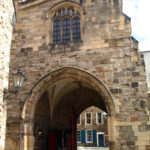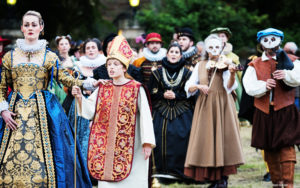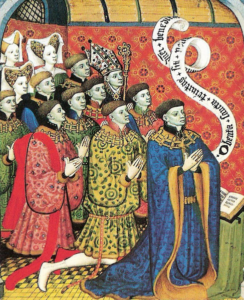REED: Durham editors Mark Chambers and John McKinnell are delighted to make available the latest set of Records of Early English Drama gathered from the documents of Durham’s great medieval monastery: from the accounts of the Almoners of Durham Priory.*
The Almoner was the monk in charge of distributing charity and charitable gifts on behalf of the monastery. The charitable responsibilities of the Almoner included the welfare of elderly men and women in an infirmary outside the abbey gate, old people’s hostels at St. Mary Magdalen, Durham and at Witton Gilbert, a house for four widows, and the Almonry (or Almery) School, whose schoolroom was immediately above the abbey gate.

Current gatehouse with chapel above (1500), leading to The College, replacing the earlier gatehouse, south-east of Durham Cathedral (courtesy of https://www.durhamworldheritagesite.com)
Most of the ‘dramatic’ records in the Almoners’ accounts relate to local folk customs. Records include payments for the folk custom of the harvest goose and perhaps a plough festival connected to it (1337-39 and following), to further plough ceremonies (such as those at Elvethall Manor in New Elvet in 1413), as well as numerous regular, usually annual, payments for the Almonry Bishop (Episcopo Elemosinarie) – the ‘Boy Bishop’ selected from the boys of the monastery’s Almonry School.

Interpretation of a Boy Bishop procession, Palace Green, Durham, July 2016. Photo credit: Michael Baker.

Illust. fr. the Book of hours of the Neville family: Ralph Neville 1364-1425 first Earl of Westmorland and his twelve children; Bibl. nat. de France)
There are also payments recorded to minstrels attached to noble households, including minstrels patronised by Ralph, Lord Neville (later first Earl of Westmoreland, born c.1364, d.1425), his son-in-law Ralph of Lumley (first Lord Lumley, 1384-1400), and Sir Ralph Euer of Witton-le-Wear, Co. Durham (c.1350-1422).
There is also record of a payment to one ‘Dominus Nicholas’ (Seynteler), appearing under ‘Pensiones’ in the account of 1458-9 as master of the children of the Almonry School; he appears to have been paid for copying the words and music for the Corpus Christi service and for a service for dedicating a church.
>> You can access the Durham Priory Almonry Records here:
Durham Priory Almonry Accounts*
*****
*The records are presented here in draft form and have not had final checking and editing for official publication by REED staff. Permission to cite this material must be sought from REED: Durham editors Mark Chambers and John McKinnell, using the contact form provided on this site.
